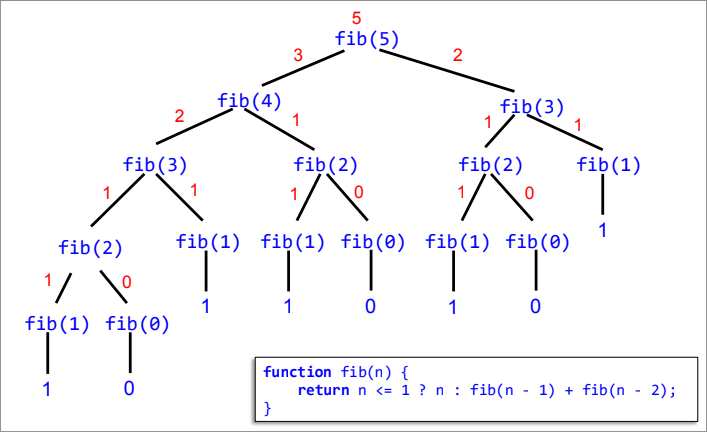recursion
Complete
Summary
Recursive processes
js
function factorial(n) {
return n === 1
? 1 // Base case
: n * factorial(n - 1);
// Bridge // Wish
}
creates deferred operations, ie. performs an operation on its recursive function call
delayed statements build up due to the substitution model
js
factorial(4)
4 * factorial(3)
4 * (3 * factorial(2))
4 * (3 * (2 * factorial(1))) // longest chain of deferred opeations, 3
4 * (3 * (2 * 1))
4 * (3 * 2)
4 * 6
24
num of steps and max num of deferred operations grow linearly with n
Accumulation of defered operations that grows proportionately to the size of the input
Iterative processes
js
function factorial(n) {
return iter(1, 1, n);
}
function iter(product, counter, n) {
return counter > n
? product
: iter(counter * product,
counter + 1,
n);
}
no operations performed on its own function call
js
factorial(4)
iter(1, 1, 4) // no deferred operations are created
iter(1, 2, 4)
iter(2, 3, 4)
iter(6, 4, 4)
iter(24, 5, 4)
24
since there are no/constant(ie. happen every recurrence) deferred operations
Concept
Functions that calls itself
- Base case
- Wish
- Bridge
Gives rise to iterative and recursive processes
Application
Fibonacci series(iterative > recursive solution)
- Recursive solution
js
function fib(n) {
return n <= 1
? n
: fib(n - 1) + fib(n - 2); // sum of previous 2 values
}
time grows exponentially, proportionately with the size of the tree
Tree for fib(n) has F(n+1) leaves, where:

- Iterative solution
js
function fib(n) {
return fib_iter(1, 0, n);
}
function fib_iter(a, b, count) {
// adding up the smaller values on the fib tree count times
return count === 0
? b
: fib_iter(a + b, a, count - 1);
}